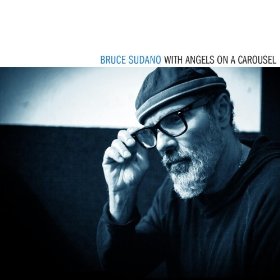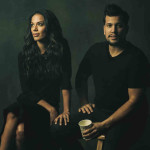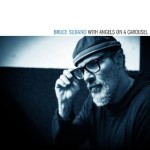 There’s a chance that you may not have heard of Bruce Sudano by name, but you’ve almost certainly heard one of his songs. The Brooklyn-bred singer/songwriter has been working in the music industry for decades as a member of bands such as Alive N’ Kickin’ and Brooklyn Dreams; it was with the latter where Sudano scored his first #1 single with “Bad Girls,” which he wrote and performed with his eventual wife, the late Donna Summer. Now, thirty years later, Sudano has been singing a different sort of song with his string of solo albums, the latest of which came out last year. With Angels On A Carousel is a harrowing listen, drawn from Sudano’s experience following Summer’s passing. While the songs on the album are tinged with tragedy, there’s still a glimmer of hope throughout the album that Sudano says is as important for the listener as it is for himself. We spoke to Sudano about the album, as well as his songwriting process and how it’s evolved after over 40 years in the business.
There’s a chance that you may not have heard of Bruce Sudano by name, but you’ve almost certainly heard one of his songs. The Brooklyn-bred singer/songwriter has been working in the music industry for decades as a member of bands such as Alive N’ Kickin’ and Brooklyn Dreams; it was with the latter where Sudano scored his first #1 single with “Bad Girls,” which he wrote and performed with his eventual wife, the late Donna Summer. Now, thirty years later, Sudano has been singing a different sort of song with his string of solo albums, the latest of which came out last year. With Angels On A Carousel is a harrowing listen, drawn from Sudano’s experience following Summer’s passing. While the songs on the album are tinged with tragedy, there’s still a glimmer of hope throughout the album that Sudano says is as important for the listener as it is for himself. We spoke to Sudano about the album, as well as his songwriting process and how it’s evolved after over 40 years in the business.
Elmore Magazine: This new string of new solo records that you’ve put out since 2004 have all been done on your own label. After working in the major label system for three decades, what was the impetus to do on your own?
Bruce Sudano: It was a combination of things. Basically, I got to a point where I didn’t want to have to compromise over direction or someone else’s opinion of the music. I really just had to say what I had to say the way I wanted to say it. My motive with these records was never to be a popstar; my motive has been to say something that can inspire or motivate or influence somebody that’s listening while leaving a legacy of how I think and feel.
EM: A couple of the videos for the album are very location-based; “Neighborhood Of My Dreams” comes to mind especially. What effect does location have on the songs that you’ve written?
BS: I have a belief that different places have different spirits, so you’re often influenced by the people that you’re around and the place that you’re in. I always tell people that Nashville, for example, has the spirit of a songwriter there. The culture down in Nashville is very songwriter-centric; it’s the kind of place where you can be a struggling songwriter and get a loan from the bank to buy a house. There aren’t a lot of other places where you can do that. They understand the nature of being a songwriter, and they accommodate you that way.
I do think most of my “locale” vibe is rooted in Brooklyn, though. It has a lot to do with where I was brought up, how I was brought up, all the things I was influenced by in those early years. I was very influenced by the culture of 5050 Broadway and the Brill Building; that’s what I grew up aspiring to be like: the Neil Diamonds and the Carole Kings of the world. Brooklyn, to me, is a very inspirational place. It’s a place of dreams, a place where you can be a normal person, but you’re still so close to getting over that bridge to the city where anything is possible. You could be a technical wizard, and the guy down the block could be a firefighter, but you’re in Brooklyn, and there aren’t a lot of places where that dichotomy exists. I think there’s a lot in Brooklyn to write about and be inspired by.
EM: You’ve worked in so many different genres and styles of music throughout your career. Do you still see a distinction between genres as you write?
BS: That goes back to my original formation as a songwriter. When I grew up, there was rock ‘n’ roll, folk, pop, and R&B, and it was all being played on the same radio station. I always viewed it as a song; how you dress it is what changes the direction of the song in terms of genre. If I write an R&B song, it might be rhythmically and instrumentally different than a rock ‘n’ roll song, but lyrically and melodically, they can be sort of the same thing. A big focus of my songwriting comes out of the lyrics. For example, when I was in Brooklyn Dreams, we were sort of a hybrid of rock, pop, and R&B. In those days, a lot of R&B songs were very basic, lyrically. What I was trying to do with Brooklyn Dreams and with songs like “Bad Girls” and a few others that were R&B-influenced was to bring a more substantial lyric to the song as well as keeping a soulful melody and a groove. A song like “Starting Over Again,” as another example, started as a pop ballad that was dressed as a country song.
EM: And then the stuff you’re doing now is dressed more like folk with a bit of blues.
BS: Yeah, and that’s really the core of who I am. When it’s me, alone in a room with a guitar, this is what you get. It’s funny that we’re talking about all of this because I was just talking to my agency about how they’re going to market me, and I’ve been telling them that they have to view me as a new artist. This album isn’t completely different from anything I’ve done before, but it’s its own thing, and it’s my own, singular voice. What I’m doing now is me broken down to the basics of what I am. I don’t have any other singers in a group, I’m not writing for another artist; this is just me. It’s a very comfortable place, and it’s very liberating. I feel very creatively fertile right now; I’m excited, and I’m motivated. I wouldn’t have anticipated that I’d be feeling this way at this point in my life, but it’s very encouraging.
EM: That directness does shine through on the album. There are literally moments of just you and a guitar, and it can have a devastating effect. Was it difficult coming up with these songs?
BS: Obviously, I was in a very…interesting time. It was a hard place to be, and I was writing from a hard place, but I was consciously trying not to make a depressing record. I wanted people to listen to it and be elevated and uplifted by it, rather than be depressed. As I was writing this record, my wife was sick and she was listening to what I was writing–including a few songs that I didn’t include on the record because they were just too dark–and she was insistent to me that my music should bring hope to people. So when I was making the record, I was very much trying to balance my emotions and not to make it so oppressive.
EM: Were you looking to inspire hope with the album while expressing yourself honestly?
BS: Yeah, that’s why I wrote songs like “At The Dawn Of Hallelujah Day.” I wanted to say “Hey, no matter how dark it gets, there’s always going to be that silver lining, and the sun will come out soon.” That’s really my mantra in life. Life is full of bumps and turns and mountains, and if you look at all the challenges in front of you, it can be overwhelming. I choose to look at it as, “Tomorrow will be brighter.” Today might be dark, but tomorrow could have you singing praises.
EM: Tomorrow is another day, yeah.
BS: That reminds me something I’ve found out as I’ve gotten older. As a songwriter, you try to avoid cliches like “tomorrow is another day.” As I’ve been living life and experiencing things, I’ve come to realize that cliches are the most true. We’ve said things like “tomorrow is another day” for years, but that’s the bottom line. It may be simple; it may be cliche, but that’s the truth.
EM: People say that things become cliches for a reason.
BS: That’s right. Exactly. As a writer, you strive to think of new ways to say the same old thing.
EM: You’ve been writing songs for 30 years. How has your process evolved over the years? Do you still find yourself learning new things?
BS: I find that I continue to grow as a writer, which is pleasantly surprising. I think I write better now than I ever did. It’s an evolution in that it gets more real, honest, naked, and more connected. At the same time, on a poetic level, I find myself to be more inspired and intuitive at the same time. One of the first albums that I wrote a lot of songs for was with my band Alive N’ Kickin.’ When I listen to that record now, I find that I wrote a lot of songs where I didn’t know what I was talking about. I was just making stuff up and writing songs about “Mississippi mud” and “Kentucky fire” and all these things that I was just imitating. Now, there’s a simplicity and a purity to my work. I’m not reinventing the wheel, but I’ve found my own voice from which to speak. It’s been a long evolution for me. It’s taken me a while to get here because of where I was writing; what I was writing for; the complexities of my life; being married to a superstar and being diverted–willingly, not resentfully–into a life where I was involved in other things which would color what I was doing. Now, there’s just a singular voice that is just who I am. It’s a great place to walk forward from.
EM: Do you see honesty as something that every songwriter needs to have in their work?
BS: Well, everyone has different strengths. For a long time, as a pop songwriter, there’s this “clever” element. Clever plays on words and stuff like that. There’s honesty involved in pop music, but i always found that the cleverness trumps the honesty. Certainly, as writer, you’d want to be clever, but my strength is in honesty. That’s how I can connect with people.





Be the first to comment!